The government’s first budget brought some good news for schools, with funding allocated to roll out free breakfast clubs to hundreds of primary schools and additional funding for school buildings, early years and SEND.
These are welcome measures, but they don’t amount to the ‘bold action’ government pledged it would take to tackle child poverty and remove barriers to opportunity. They leave family incomes stretched and children going without all that they need to thrive.
Teachers and school staff see the impact of this on a daily basis: children without technology to complete homework, pupils missing school because they can’t afford bus fares, and pupils struggling to concentrate because they are distracted by worry about family finances.
In an average classroom, nine children in every 30 are growing up in poverty. School staff are also increasingly witnessing hungry children not getting enough to eat.
The expansion of breakfast provision in primary schools is a first step towards addressing child hunger in our classrooms, but the free school meal (FSM) system plays a crucial role in helping to protect some children from hunger too. Unfortunately, the autumn budget didn’t commit any funding to strengthen that system.
As it stands, the FSM system leaves too many children without a good school lunch while schools are burdened with administering an overly complicated system. And hard-up parents who are not entitled to FSM struggle to afford school food or find money for an equally filling packed lunch.
Nine hundred thousand children in poverty are not eligible under the very restrictive FSM earnings threshold of £7,400 per year for those in receipt of universal credit. This leaves lots of low-income families under pressure to provide packed lunches or pay for school meals.
The issue of dinner money debt shines a spotlight on why changes and investment in the free school meal system are crucial, as our recent investigation showed. We found many families are struggling with the cost of school meals and this is resulting in school meal debt building up.
While some schools have no dinner money debt, our survey of headteachers, trust leaders and school business managers found 39 per cent of schools report an increase in dinner money debt over the past two academic years (2021/22 compared to 2023/24).
The school meal system isn’t working for children, parents or schools
Eighty-two per cent of schools we surveyed said dealing with debt, managing and monitoring payments is taking up staff time and capacity, and 71 per cent said school meal debt tightens the screw on already-depleted school budgets.
The scale of school meal debt varies from school to school, but its impact is clear and wide-reaching. At a time when we need to build bridges between families and schools to tackle the attendance crisis, 73 per cent of schools responding to our survey reported that chasing school meal debt puts a strain on relationships with parents.
Dinner money debt makes it harder for schools to speak to families about other things and creates an invisible barrier between schools and families. And the end of the school year doesn’t bring any respite for families, as 70 per cent of schools carry debts over to the new academic year.
Of course, schools recognise the difficulties for families and are working to support them. Twenty-eight per cent of schools told us they wipe debts for some families. However, for children, when dinner money debt builds up, it can make for a miserable time in the dining hall.
As one Senior Leader of a Multi-Academy Trust told us: “Children start to resent things and look upset at lunchtime. Some refuse to eat. Staff talk of the time it takes to sort out who is on a dinner and who isn’t. Children sneak into the line to take a lunch.”
Forty-five per cent of schools said that they encourage indebted families to move their child to packed lunch. But that can mean children don’t get all the nutrition that there is in a school lunch.
In one in 10 schools we surveyed, children are given different meal options if their lunch account has a negative balance, often meaning they stand out in the dining hall.
Eating together is a fundamental part of school life, but the school meal system isn’t working for children, parents or schools. Ministers must urgently change the qualifying threshold for free school meals so that all children living in low-income families can get a filling meal in the middle of the day.
But it is only with a move to universal provision of lunches for all children and the removal of means-testing from the dining hall that the problems we identified will be resolved completely.
That is the ‘bold action’ we need to stop classroom hunger and enable schools to focus on their core function of education.
Read the full report, ‘The cost of school mead debt’ here








I’ve just finished working in an academy high school in the kitchen.
The food was cooked fresh using good ingredients however because the company contracted to provide the catering worked on a 50% GP the portions were very small.
The children would spend most of their dinner money on high sugar food such as cakes and biscuits, drinks or popcorn.
Even bottles of water was 80p for a small bottle.
They should be ashamed.